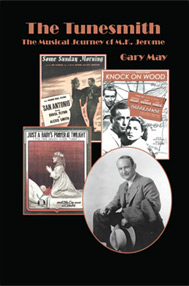Gary May's insightful book unveils the life of M. K. Jerome, Hollywood's legendary songwriter. Journey from Tin Pan Alley to World War II blockbusters as May masterfully brings the Great American Songbook to life.
New book about Hollywood studio songwriter details labor disputes during the Golden Age of Film
Moe would not be surprised by today’s strikes. He joined striking songwriters in the 1920s seeking better pay when his compensation was based on how many copies of sheet music were sold.”
— Gary May
NEWARK, DELAWARE, UNITED STATES, July 25, 2023/EINPresswire.com/ -- While most of the media’s attention has focused on writers, actors, and others on strike, little attention has been given to how songwriters were treated by the major studios over the years.
A reporter once asked songwriter M.K. Jerome where he got the inspiration for his 1500 songs. “Inspiration had nothing to do with it,” he replied. “It was all about compensation. When you turn out a couple of hundred songs a year,’’ he explained, “it becomes more of a business than fun.’’
As a staff songwriter for a major studio during one sixth-month period in 1936-37, Jerome and his lyricist partner Jack Scholl, were required to write 28 original songs for movies; 18 were written for westerns, eight were used in a variety of features—comedies and dramas—while two were used in short subjects. Like today’s striking actors, Jerome and Scholl wished for fair and just working conditions, but it was a struggle they rarely won.
Few of the songs were hits or even as good as Jerome’s work on Tin Pan Alley, which made him often disappointed and depressed. Movie songs were known in the trade as ‘’situational numbers,’’ Songs written according to a specific situation. Dramas required music that heightened suspense; romances were supposed to be soft and melodic. But they always remained prisoners of the star or producer. In Howard Hawks’ Ceiling Zero starring James Cagney, Pat O’Brian, and June Travis, Jerome had to write a song for a nightclub scene where Cagney and Travis drink, dance, and flirt. Dancing required music, supplied by Jerome, but no lyrics were needed. Cagney and Travis chat over the music so it’s impossible to determine whether the melody, titled ‘’Lucky,’’ was any good. It certainly wasn’t ‘’Lucky’’ for Jerome who didn’t even receive screen credit.
Besides being forced to write dozens of songs not expected to become hits, he had to compete with other songwriters who received better assignments. Among Jerome’s chief competitors were Harry Warren and Al Dubin. By January 1937, Jerome and Scholl were first at the studio, having written a total of 43 songs, surpassing both Warren and Dubin (28) and Harold Arlen and E.Y. ‘’Yip’’ Harberg (23). Variety called the team of Jerome and Scholl, ‘’The Tunemill.’’
The stress that accompanied the extraordinary demands of creating song after song affected both songwriters Dubin and Jerome.
Dubin’s appetites were gargantuan—for food( he weighed 320 pounds) liquor, horse racing, and women. Eventually, he became addicted to drugs, ruined his health and career, and died at 53.
While Jerome’s reaction was not as extreme as Dubin’s, he was not immune to the constant tension and anxiety. He smoked constantly, sometimes drank to excess, and later developed ulcers, and cardiovascular diseases. He too would eventually pay the price of seeking success in Hollywood.
Jerome joined striking songwriters in the 1920s seeking better pay for their work. In the 1920s songwriters' compensation was based on how many copies of sheet music were sold. Like today’s striking actors, Jerome and Scholl wished for fair and just working conditions, but it was a struggle they rarely won.
We should also remember that Hollywood’s greatest actors—James Cagney Bette Davis and Humphrey Bogart warred with studio bosses and sought better roles and ultimately went on strike to achieve it. M.K. Jerome would have joined them.
###
Gary May is a historian and grandson of M.K. Jerome. He is the author of The Tunesmith: The Musical Journey of M.K. Jerome published by BearManor Media.
Gary May
The Tunesmith: The Musical Journey of M.K. Jerome
+1 302-598-9696
email us here
![]()


